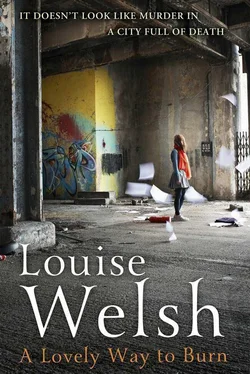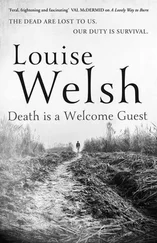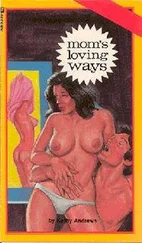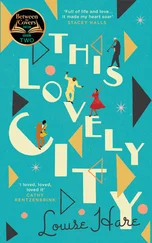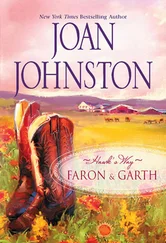Her death had been an accident. Nothing else made sense. The man was desperate to acquire the laptop and though Stevie had felt his willingness to kill her in the twist of silk around her throat, there was nothing a corpse could tell him.
He had hit the woman, to show he meant business, and she had fallen badly, smashing her skull against the unforgiving corner of the desk. Stevie wondered if the man had been sorry, or if he had merely felt the impatience of someone who had cocked up at work, the fuck-shit of a bad day at the office, and the embarrassment of having to report to the boss that things had gone out of kilter, sales figures were down, productivity lower than it should be, the bid rejected, a woman dead.
There was bile in her throat, and Stevie realised that it was her own head she saw slamming against the desk, her own blood soaking the carpet.
‘You’re alive,’ she whispered. ‘So get on with it, before you really do end up with your head staved in.’
She rooted gingerly through the mess on the floor, careful to avoid the traces of blood. For an instant she thought she had found an envelope, but even before she touched it she saw what it was: a small, beige clutch bag. She opened it and found a lipstick, a card wallet, a set of car keys, an iPhone and a small, old-fashioned-looking, snub-nosed revolver. Stevie tried to remember how movie gangsters and detectives opened their guns to check their bullets, but the only image that came to mind was a spinning chamber; a game of Russian roulette.
The wallet contained a clutch of credit cards in the name of Mrs Hope Black and several business cards bearing her name and an address in Kentish Town. Stevie knew the street. It was a short drive from Simon’s flat, the home of a deli where she had sometimes bought olives and wine for them to share.
Stevie stood at the foot of the woman’s veiled body, like a priest about to say a prayer. She whispered, ‘If I get the chance, I’ll kill him for you.’
But in her heart Stevie knew that if she killed anyone, it would be to make herself safe.
Hope Black’s Jaguar had leather seats, a walnut dashboard, a full tank of petrol and a satnav that had been carefully stowed in the glove compartment. Stevie walked the pavements around Simon’s building, pressing the key fob she had found in the dead woman’s bag, until she heard an answering chirp and saw the tell-tale flash of indicator lights. There was no one there to observe the theft, but the empty streets made her feel exposed and Stevie was glad when she was in the driver’s seat with the door safely locked.
Better Bets was in the middle of a small parade of shops. She parked in an adjacent road and walked the final stretch, nervous of what might happen were someone to spot her driving Hope Black’s car.
A man and a woman were walking along the street towards her, both of them wearing white surgical masks over their mouths and noses, like Beijing citizens on a poor-air day. They saw her and crossed to the opposite pavement, the man’s hand cupping the woman’s elbow, as if to encourage her to walk faster. The woman had her head lowered but the man made eye contact with Stevie, and then quickly looked away, as if he couldn’t afford to risk any more empathy.
Stevie took out her phone and called Iqbal, and then Derek. Neither of them picked up. It meant nothing, she reassured herself, nothing. Batteries faded, people fell asleep, mislaid their phones, or simply chose not to answer. A missed call was not an intimation of death.
An elderly man was sitting on the pavement outside Better Bets, his back resting against the shop’s shuttered window, his cap lowered over his face. He was smartly dressed, in a brown jacket, checked shirt and tweedy trousers, as if he had set out for a long autumn walk rather than a summer stroll in the city. Stevie had passed by hundreds of rough sleepers, beggars, drunks and junkies in her years in London, but the old man’s carefully-put-together outfit reminded her of her dead granddad. She saw that the scuffs on the old man’s jacket were recent and squatted down beside him.
‘Are you okay?’
A wisp of white hair had escaped from beneath the man’s hat. It bent in response to the breeze, but his head remained sunk on his chest. Stevie had touched enough corpses for one day, but she thought she saw a faint flutter beneath the old man’s eyelids. Joanie, Simon and Hope had each been beyond help, but if the man was alive she might be able to do something for him. Perhaps there was an anxious relative she could phone. Stevie lifted his wrist and felt for a pulse. There was nothing.
‘You’re doing it wrong.’
‘Christ!’ Stevie jolted backwards. She remembered the way Django had leapt when the Taser hit him and hoped he had found his way back to Doris and John’s champagne. ‘Sorry, you gave me a fright.’
‘You need to press further down, on the artery.’ The old man’s voice was a raw whisper, catgut-stretched and dried. ‘You won’t feel nothing dicking around up there,’ he croaked.
‘Sorry.’ Stevie had jumped at the sound of his voice, but the knowledge that the man was dying didn’t shock her the way it would have done before. ‘Can I get you something?’
‘A blow-job.’ His laugh was a wheeze of old bones and stale air. ‘Sorry, love. Good of you to ask.’ He narrowed his eyes in an effort to focus on her face. ‘You healthy?’
‘Yes.’
‘Keep away from infected people like me.’
‘I’ve had it.’
‘Don’t matter. I was an ambulance driver. I know about these things. Pretty soon there’ll be rats, then cholera, typhoid, who knows what. Do yourself a favour. Keep your distance.’
‘Are you sure you wouldn’t like me to get you some water, or phone someone to come and collect you?’
‘You just do as I told you. Being a Good Samaritan’s all fine and well, except for when it kills you.’ He gave her a smile that was all death. ‘You got any kiddies?’
‘No.’
‘Neither did we. Would have liked some. Now I reckon it’s a blessing we never did, things being as they are.’
She had seen very few children since the crisis began, Stevie realised. She imagined them, huddled in their houses, hidden from the sweats by their parents, the way Anne Frank’s mother and father had hoped to hide her from the Nazis.
‘It’s not so bad at the end,’ the old man said. ‘I saw it with my wife. You think you’re getting better, you stop being sick and the headaches take a back seat, then you realise you’re on your way out anyway. Another of nature’s little jokes. But it ain’t painful any more. That’s about the best you can hope for in this life, an easy death.’ A tear slipped its way down his cheek. ‘Piss off and give me peace to look at the sky.’
Stevie touched his shoulder and got to her feet.
The door to the betting shop was closed, its metal shutter rolled halfway down. Stevie banged against it and when there was no reply, pushed the shutter up and tried the door. It was locked. She rapped against the wood, then took Hope Black’s clutch from her bag, fished out her keys and tried each of them, until one turned smoothly in the lock.
‘Hello?’
She pushed the door open and stepped inside. The shop was dark. It smelt stale, like the house of someone who had become too old, or too ill, to take care of themselves.
‘Hello?’ She took another cautious step.
The flat-screen televisions ranged around the room glowed blue and silent, lit with error messages. The space behind the screened counter, where bookies must have calculated the odds, was empty. Stevie had stuffed the leather clutch at the bottom of her bag, wary of the awkward questions that might be asked, should someone recognise it. Now she wondered if she should have slipped the gun into her pocket. It was too easy to imagine someone leaping out from behind the deserted counter. She pushed against the door that would take her into the bookmaker’s stall and the private sanctum beyond. It was locked tight.
Читать дальше
